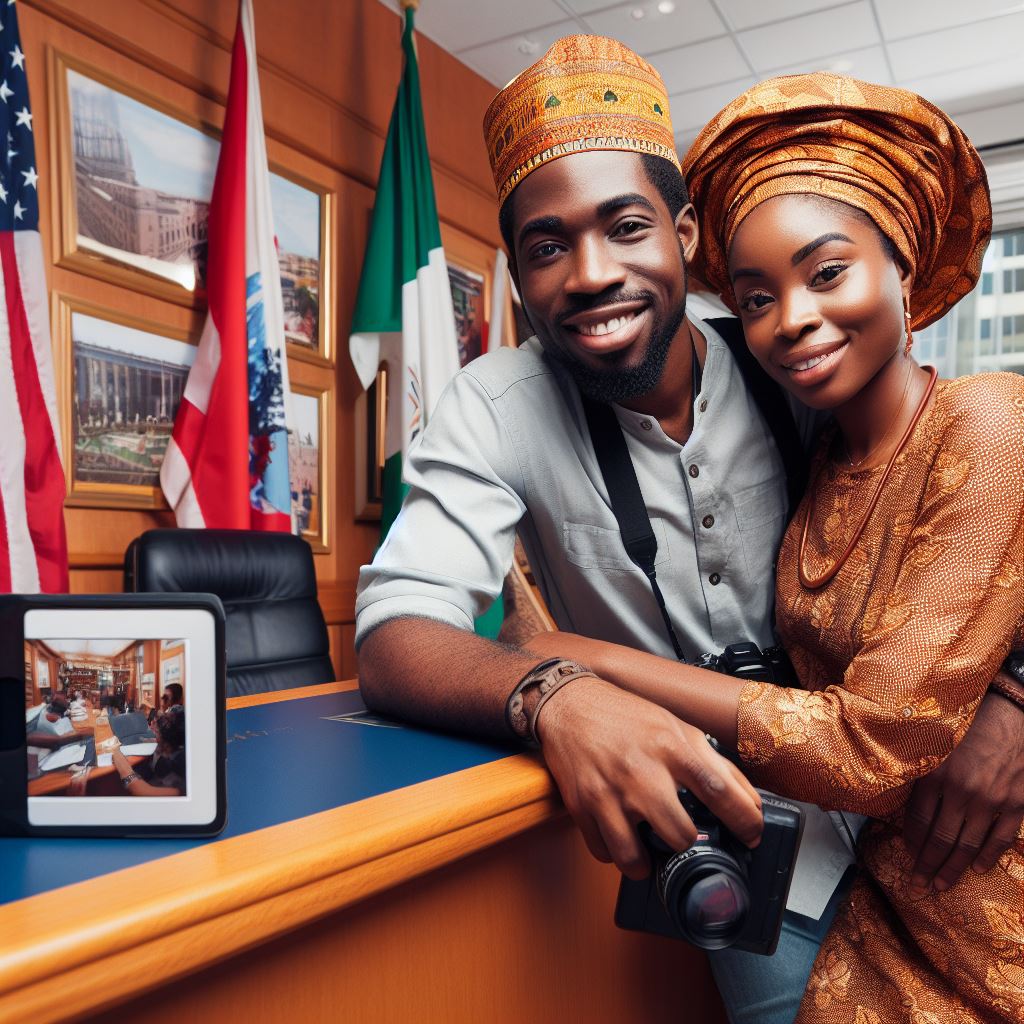The Legal Implications of Marrying for Citizenship
Last Updated on October 23, 2023
Introduction
Let’s explore the legal implications of marrying for citizenship.
Welcome to our blog section on the legal implications of marrying for citizenship.
In this section, we will provide a brief overview of the topic and discuss the importance of understanding these legal implications.
Marriage is a legally binding contract between two individuals, but when it comes to marrying for citizenship, the stakes are much higher.
Marrying a citizen of another country with the intention to acquire citizenship yourself can have significant legal consequences.
Understanding the legal implications of marrying for citizenship is crucial for several reasons.
Firstly, it ensures that both parties are aware of their rights and responsibilities within the marriage and immigration process.
By understanding the legal implications, individuals can make informed decisions about their commitment and the potential consequences they may face.
This knowledge can help avoid any misunderstandings or legal issues that may arise during the immigration process.
Furthermore, being aware of the legal implications allows individuals to protect themselves and their interests.
They can take the necessary steps to navigate the complex immigration laws, including obtaining the correct visas, ensuring proper documentation, and complying with immigration regulations.
Lastly, understanding the legal implications helps maintain the integrity of the immigration system.
Marrying solely for citizenship without genuine intent is considered fraud, and individuals involved may face legal penalties, including deportation and never being able to obtain citizenship in the future.
In short, educating oneself about the legal implications of marrying for citizenship is crucial.
It not only protects individuals’ rights and interests but also ensures the integrity of the immigration system.
Stay tuned for our next section, where we will delve deeper into the specific legal aspects of marrying for citizenship.
Definition of marrying for citizenship
Marrying for citizenship refers to marrying someone solely to obtain citizenship in a particular country.
This practice involves entering into a marriage for immigration purposes.
Typically, it involves an arrangement between a willing citizen and a foreigner who desires citizenship.
What it means to marry someone solely for the purpose of obtaining citizenship
Marrying someone solely for the purpose of obtaining citizenship raises various legal implications.
These implications can have significant consequences for both the individuals involved and the state.
- Immigration Fraud: Marrying for citizenship with no intention of establishing a genuine marital relationship is considered immigration fraud. This fraudulent act undermines the integrity of immigration systems and can lead to severe penalties, including deportation and permanent ineligibility for citizenship.
- False Documents: Marrying for citizenship often involves the use of false documents or misrepresentation of information. Providing false documentation during the immigration process is a criminal offense and can lead to serious legal consequences.
- Criminal Penalties: Engaging in a marriage solely for the purpose of obtaining citizenship can result in criminal charges. Individuals found guilty may face imprisonment, fines, or both, depending on the country’s laws.
- Annulment or Divorce: If authorities discover that a marriage was entered into solely for citizenship purposes, it may be considered void. The marriage can be annulled or lead to divorce, as it lacks the essential element of a genuine commitment.
- Immigration Consequences: When a marriage is found to be fraudulent, the intending immigrant may be denied entry into the country. Additionally, they may be subject to deportation if already residing in the country.
- Denial of Citizenship: Participating in a fraudulent marriage can result in the denial of citizenship for both the immigrant and the citizen sponsoring them. This denial can have long-lasting implications on their ability to obtain citizenship in the future.
It is important to emphasize that marriage for citizenship should always be based on genuine love and commitment.
Engaging in fraudulent marriages not only violates the law but also undermines the principles of marriage and immigration.
It is crucial for individuals to consult legal professionals and explore legitimate immigration options to avoid legal complications and promote a fair immigration system.
Read: Marriage to a Nigerian: Steps to Secure Citizenship
Legal consequences for those who marry for citizenship
Marriage is often seen as a celebration of love and commitment, but when it comes to marrying for citizenship, there are legal consequences that shouldn’t be taken lightly.
In many countries, marrying a citizen is a shortcut to obtaining citizenship, but this practice is not without its legal implications.
Fraudulent marriages can result in serious penalties, including fines and imprisonment.
Legal actions may be taken against both the foreign spouse and the citizen involved in the fraudulent marriage.
Immigration fraud and its penalties
Marrying solely for the purpose of obtaining citizenship is considered immigration fraud.
Immigration fraud can be punished by deportation, denial of future immigration benefits, and even criminal charges.
Case studies or examples of real-life legal consequences
In the infamous case of “Operation Varsity Blues,” several individuals were charged with using fraudulent marriages to gain citizenship benefits.
These individuals faced substantial fines, imprisonment, and reputational damage as a result of their fraudulent acts.
Marriage fraud not only undermines the integrity of the immigration system but also poses risks to genuine applicants who follow legal procedures. Therefore, it is crucial to understand the legal implications of marrying for citizenship.
List of legal consequences for those who marry for citizenship
- Loss of credibility: A fraudulent marriage undermines the credibility of the individuals involved.
- Marital fraud penalties: Both the foreign and citizen spouse can face criminal charges and significant penalties.
- Denial of citizenship: The fraudulent spouse may be denied citizenship, leading to potential deportation.
- Permanent residency revocation: If fraudulent marriage is discovered after obtaining permanent residency, it can be revoked.
- Future immigration restrictions: Fraudulent spouses may face restrictions or bans on future immigration applications.
Examples of real-life legal consequences
- The case of Manuel and Angela: Manuel, a foreign national, married Angela to gain citizenship. They were eventually caught, resulting in a hefty fine, imprisonment, and deportation for Manuel.
- The case of Simran and John: Simran, seeking citizenship, entered into a fake marriage with John. They were caught, leading to a criminal record and denial of future immigration benefits for both.
It is essential to note that marrying for citizenship should not be a means to an end. Instead, individuals should opt for legal immigration procedures to avoid severe legal consequences.
Steps to avoid legal consequences
- Understand immigration laws: Familiarize yourself with the immigration laws of your country to ensure compliance.
- Genuine relationships: Marry for genuine reasons of love and commitment, not solely for immigration benefits.
- Seek legal advice: Consult with an immigration lawyer to navigate the process legally and avoid fraud allegations.
- Maintain documentation: Maintain accurate and genuine documentation to support your marriage and immigration application.
By understanding the legal implications and consequences of marrying for citizenship, individuals can make informed decisions and avoid jeopardizing their future prospects.
Remember, shortcuts may seem tempting, but they often lead to long-lasting legal troubles.
Read: The Process of Applying for Nigerian Citizenship by Marriage

Challenges faced by couples who marry for citizenship
Cultural and language barriers
When couples from different countries marry for citizenship, they may struggle with cultural differences and language barriers.
These issues can create misunderstandings and hinder effective communication within the relationship.
The clash of cultural norms and customs can lead to conflicts between the couple.
Certain practices or expectations may vary widely, causing frustration and tension.
Additionally, language barriers can further complicate matters, making it challenging to express feelings, opinions, and desires accurately.
To navigate these challenges, couples need to establish open and honest communication.
They should actively invest time and effort in learning about each other’s cultures and languages to bridge the gap.
Seeking professional language or cultural training can also be beneficial in promoting mutual understanding and harmony.
Difficulties in proving the authenticity of the marriage
Marrying for citizenship often raises suspicions, and immigration authorities closely examine such marriages to ensure authenticity.
This process can be demanding for couples, as they must demonstrate a genuine relationship.
The burden of proof lies on the couple to provide evidence of a bona fide marriage.
This evidence can include joint financial statements, shared property or assets, photographs together, correspondence, and testimonies from friends and family attesting to the legitimacy of the union.
However, gathering sufficient evidence can be daunting, especially for couples who have not spent a significant amount of time together or have limited shared experiences.
The scrutiny from immigration authorities adds pressure to the relationship, causing stress and anxiety.
Couples should proactively plan and organize their documentation to address these challenges.
Seeking professional legal guidance can also be beneficial to navigate the complex immigration process and ensure they have the necessary evidence to prove the authenticity of their marriage.
Emotional strain on the relationship
Marrying for citizenship can put a significant emotional strain on the relationship due to the unique challenges and uncertainties involved.
The decision to marry for citizenship often stems from a desire for a better future and opportunities.
However, this motivation can overshadow the emotional connection between partners and lead to relationship imbalance.
The pressure to meet immigration requirements and the fear of potential immigration consequences can create anxiety and tension within the relationship.
Partners may feel overwhelmed and torn between their emotional bond and legal obligations.
To mitigate the emotional strain, couples should openly discuss their motivations and expectations before embarking on the marriage journey.
Regularly evaluating the emotional well-being of both partners and seeking professional counseling or support can also be beneficial in navigating the challenges.
In essence, couples who marry for citizenship face various challenges, including cultural and language barriers, difficulties in proving the authenticity of the marriage, and emotional strain on their relationship.
Recognizing these challenges and actively working together to address them can strengthen the bond between partners and increase the chances of a successful outcome.
Read: Requirements for Obtaining Citizenship through Marriage
Benefits of Marrying for Citizenship
Marriage can be considered a pathway to a better future and improved quality of life.
When someone marries for citizenship, they gain access to various benefits and opportunities that can greatly enhance their lives.
Access to Better Opportunities, Education, and Healthcare
One of the significant advantages of marrying for citizenship is the access it provides to better opportunities.
Becoming a citizen of a new country opens doors to a wider range of employment prospects.
This, in turn, increases the chances of landing a well-paying job and achieving financial stability.
Furthermore, education plays a vital role in determining one’s career trajectory.
By marrying for citizenship, individuals gain access to quality education systems in their new country.
This can lead to higher academic achievements and ultimately contribute to a successful professional life.
Additionally, healthcare is a critical aspect of one’s well-being.
In many countries, citizens receive better healthcare coverage compared to residents or non-citizens.
Marrying for citizenship grants individuals access to improved healthcare services, which can have a positive impact on their overall health and well-being.
Potential for a Stable Future and Improved Quality of Life
Marrying for citizenship offers the promise of a stable future.
It provides a strong foundation for individuals to build their lives upon, as they gain legal rights and protection through marriage.
This stability can have profound effects on various aspects of life, including family, finances, and personal security.
Furthermore, marrying for citizenship often leads to an improved quality of life.
Citizens generally enjoy more rights and privileges than residents or non-citizens.
These rights may include the ability to vote, access to social benefits, and the freedom to travel more easily.
The improved quality of life can contribute to greater happiness and a sense of belonging in the new country.
Examples of Positive Outcomes from Marrying for Citizenship
There are numerous examples of individuals who have benefited greatly from marrying for citizenship.
Consider the case of Maria, a young woman from a developing country who married a citizen of a prosperous nation.
After obtaining citizenship through marriage, Maria had access to better job opportunities.
She secured a position at a prestigious company, which provided her with a significantly higher salary and better benefits.
This allowed her to support her family back home and also invest in her own personal growth.
Moreover, by marrying for citizenship, Maria gained access to higher education opportunities.
She enrolled in a renowned university and earned a degree in business administration.
This educational background opened doors to even more lucrative career prospects and further contributed to her financial stability.
Additionally, through her new citizenship, Maria had access to top-notch healthcare.
This ensured that she and her future family would receive the best medical care possible, giving them peace of mind and a sense of security.
In general, marrying for citizenship can have significant benefits that positively impact one’s life.
Access to better opportunities, education, healthcare, and the potential for a stable future are just a few examples of the advantages gained through such a union.
It is important to consider these benefits when examining the legal implications of marrying for citizenship.
Read: Pros & Cons of Marriage-Based Citizenship in Nigeria
Ethical considerations
The debate around the ethics of marrying for citizenship raises important questions.
There are different opinions on the subject, with some arguing it is morally wrong.
Others believe that marrying for citizenship can be justified in certain circumstances.
Examining the moral implications is crucial to understanding the impact on individuals and society.
Debate around the ethics of marrying for citizenship
The issue of marrying for citizenship is a highly controversial topic.
Some argue that it undermines the integrity of immigration systems.
They believe that individuals should gain citizenship through legitimate means, such as work visas or naturalization.
Others argue that love should not be restricted by borders and that marrying for citizenship is a valid option.
Different opinions on the subject
Those opposed to marrying for citizenship argue that it encourages fraudulent relationships.
They believe that people are taking advantage of the system for personal gain.
On the other hand, proponents argue that marrying for citizenship allows individuals to build a better life.
They argue that it provides opportunities for love, companionship, and access to a new country.
Moral implications and their impact on individuals and society
Marrying for citizenship can have significant moral implications for individuals involved.
It raises questions about the authenticity of the relationship and the intentions of those involved.
For some, marrying for citizenship may feel like they are compromising their personal values.
Additionally, society may view such marriages as unethical or even fraudulent.
The consequences of marrying for citizenship can extend beyond the individuals involved.
It can affect immigration policies and attitudes towards immigrants in society.
These moral implications highlight the complexities and ethical dilemmas surrounding the issue.
Conclusion
Marrying for citizenship has significant legal implications that individuals need to consider carefully.
Throughout this blog section, we discussed key points such as the potential fraud involved, the importance of genuine relationships, and the consequences of misrepresentation.
It is crucial for individuals to understand the gravity of this decision and the potential consequences it may have on their immigration status.
It is not only a legal matter but also a moral one.
Before deciding to marry for citizenship, individuals should seek legal advice, understand the requirements, and be fully prepared to comply with immigration laws.
They should also understand that the authorities are increasingly vigilant in detecting fraud marriages.
Marriage is a sacred institution, and using it solely as a means to gain citizenship undermines its true purpose.
It is essential to respect the sanctity of marriage and not enter into it with dishonest intentions.
In making such a life-altering decision, individuals should reflect on their values, ethics, and personal integrity.
They should think deeply about the consequences for themselves, their partners, and the potential legal repercussions that may arise.
Ultimately, marrying for citizenship is a complex issue that should not be taken lightly.
It requires careful consideration and understanding of both the legal and moral implications.
It is crucial to prioritize honesty, transparency, and genuine relationships in matters of immigration and citizenship.


